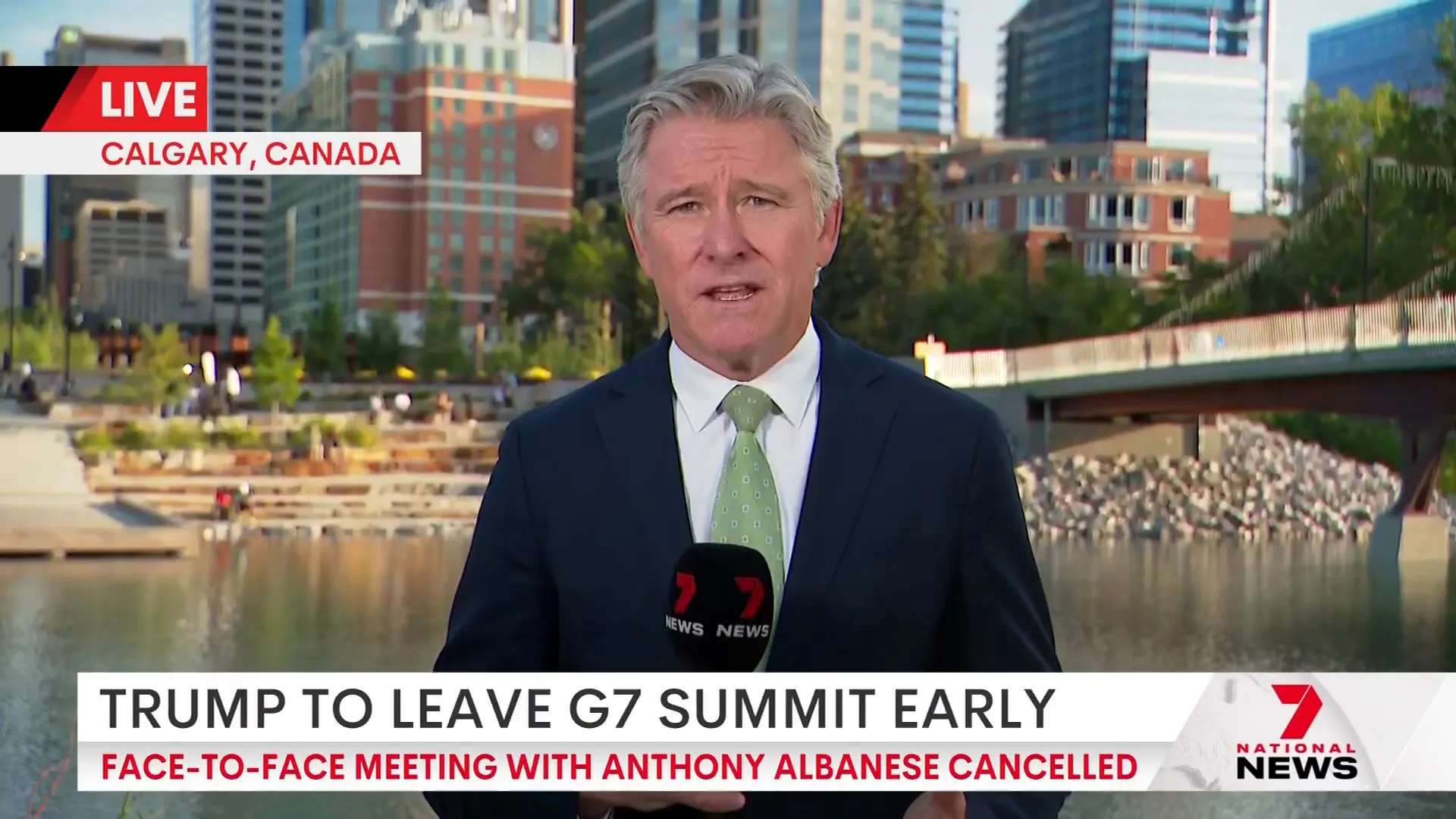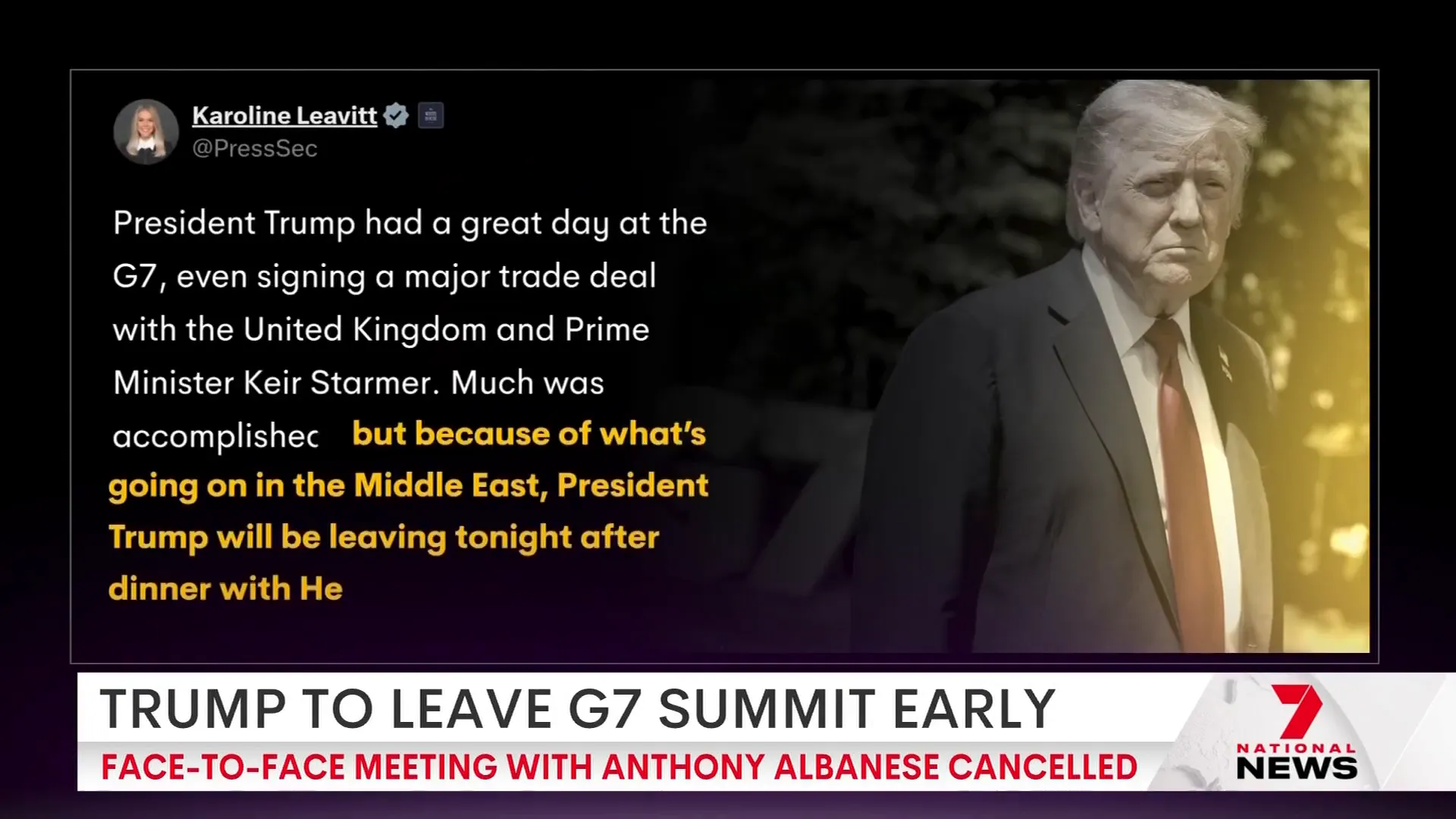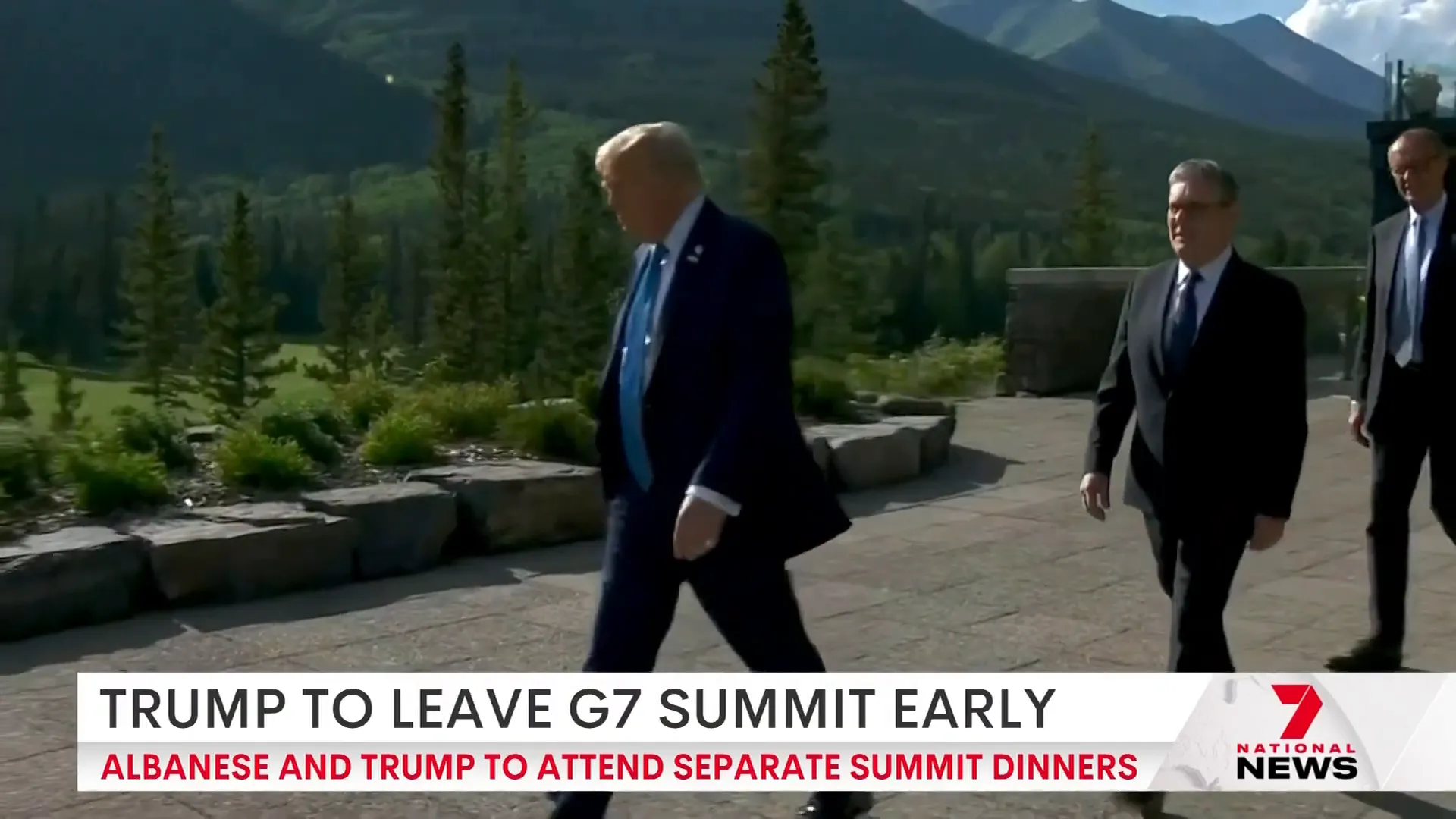Jun 17, 2025
Trump's Sudden Exit from G7 Derails Albanese Meeting
In a surprising turn of events at the G7 summit in Canada, former US President Donald Trump made an abrupt departure, cutting short his participation and cancelling a highly anticipated meeting with Australian Prime Minister Anthony Albanese. This unexpected exit came amid escalating tensions in the Middle East, prompting Trump to rush back to Washington to address an ongoing conflict. The sudden move not only disrupted diplomatic plans but also cast a shadow over key discussions on trade and security agreements, particularly the future of AUKUS and tariff negotiations.
Table of Contents
- The Unexpected Exit: What Happened?
- Albanese’s Preparations and Disappointment
- Trump’s Explanation and Global Reactions
- Implications for AUKUS and Trade Negotiations
- Broader Diplomatic Fallout
- What’s Next for Anthony Albanese?
- Conclusion
- FAQ
The Unexpected Exit: What Happened?
Donald Trump's early exit from the G7 summit was announced with urgency and little prior warning. As the president prepared to leave, he issued an anonymous warning urging the nearly 10 million residents of Tehran, Iran's capital, to evacuate immediately. This stark message underscored the gravity of the situation unfolding in the Middle East, compelling Trump to prioritize his return to Washington.
For Prime Minister Anthony Albanese, this development was a major setback. The Australian leader had been poised to engage in a face-to-face meeting with Trump, aiming to discuss crucial issues, including the future of the AUKUS security pact and potential exemptions from US tariffs that have affected Australian trade.

Albanese’s Preparations and Disappointment
Before the news broke, Anthony Albanese appeared optimistic and well-prepared for his scheduled talks with Trump. He revealed at a news conference that he had sought extensive advice from a wide network of political insiders and experts, both those familiar and unfamiliar with Trump’s style. Albanese was confident he could represent Australia's best interests effectively during the discussions.
"I was ready for a moment where I was going to represent Australia's best interest," Albanese remarked, highlighting the importance he placed on the meeting.
However, the announcement of Trump’s early departure came just as Albanese was concluding his news conference, delivered by White House Press Secretary Caroline Levitt via Twitter. The Australian prime minister received no prior heads-up, making the news all the more disappointing.

Trump’s Explanation and Global Reactions
At the G7 leaders' family photo session in Kananaskis, Trump briefly addressed his departure, emphasizing the urgency of the situation back home.
"I have to be back. Very important. I want to thank our great host and the fantastic people in Canada. But you probably see what I see and I have to be back as soon as I can," Trump said. "I have to be back early."
This announcement came just moments after British Prime Minister Sakir Starmer had concluded a positive face-to-face meeting with Trump. Starmer and Trump agreed on a tariff deal between the US and the UK, which included concessions on agriculture—a point of contention for Australia, which remains firm on its own tariff positions.

Implications for AUKUS and Trade Negotiations
The AUKUS alliance—a trilateral security pact between Australia, the United Kingdom, and the United States—is a cornerstone of Australia’s defense strategy. Albanese was eager to discuss both Pillar One and Pillar Two of the agreement with Trump, aiming to secure commitments that would strengthen the pact's future.
British Prime Minister Starmer expressed optimism about the ongoing cooperation within AUKUS during his joint press conference with Trump:
"We're proceeding with that. It's a really important deal to both of us. We're very long-time partners and allies and friends," Starmer said. "It is in Australia, the United States, and the United Kingdom's interest that AUKUS not just proceed in terms of pillar one, but pillar two as well."
For Australia, the inability to meet directly with Trump is a significant diplomatic challenge. The tariff concessions agreed upon by the UK and US included agricultural products, which Australia has been reluctant to offer in similar negotiations. Albanese had hoped to negotiate an exemption or relief from the tariffs imposed by the US, which have impacted Australian exports.
Broader Diplomatic Fallout
Trump’s sudden departure disrupted more than just the Australian agenda. Other world leaders also faced cancellations of their one-on-one meetings with the US president. Ukrainian President Volodymyr Zelensky, who was scheduled to meet Trump the following day, along with Indian Prime Minister Narendra Modi, experienced similar disappointments.
These cancellations highlight how rapidly shifting global events, especially conflicts in volatile regions, can impact international diplomacy. The G7 summit, meant to be a platform for collaborative leadership and strategic discussions, was overshadowed by urgent geopolitical concerns.
What’s Next for Anthony Albanese?
As of now, there is no clear timeline for when Prime Minister Albanese might get another opportunity to meet with Donald Trump. The global situation remains fluid, and diplomatic schedules are subject to change based on emerging priorities.
Despite the setback, Albanese remains committed to advancing Australia’s interests on the international stage, particularly regarding trade and security alliances. The prime minister’s office is likely to seek alternative channels to continue discussions on AUKUS and tariff matters.
Conclusion
Donald Trump’s sudden exit from the G7 summit was a dramatic moment that underscored the unpredictable nature of global politics. For Australia, the missed opportunity to engage directly with the US president was a significant diplomatic disappointment, especially with critical issues like AUKUS and trade tariffs on the table.
While the immediate future of these discussions is uncertain, the event serves as a reminder of how quickly world events can reshape international agendas. Prime Minister Albanese’s preparedness and willingness to engage reflect Australia’s proactive approach to global partnerships, even in the face of unexpected challenges.
As the situation in the Middle East continues to evolve, the international community will be watching closely to see how leaders recalibrate their strategies and commitments in response to emerging threats and geopolitical realities.
FAQ
Why did Donald Trump leave the G7 summit early?
Donald Trump left the G7 summit early to return to Washington and address an ongoing conflict in the Middle East. He also issued a warning for people in Tehran to evacuate, highlighting the seriousness of the situation.
What was the significance of the planned meeting between Trump and Albanese?
The meeting was expected to focus on the future of the AUKUS security pact and potential exemptions from US tariffs affecting Australian exports. It was a key diplomatic opportunity for Australia to strengthen its relationship with the US.
How did British Prime Minister Sakir Starmer's meeting with Trump differ from Albanese's experience?
Starmer successfully met with Trump and secured a tariff deal between the US and the UK, including concessions on agricultural products. This was in contrast to Albanese, whose meeting was cancelled due to Trump's sudden departure.
What is AUKUS and why is it important?
AUKUS is a trilateral security pact between Australia, the United Kingdom, and the United States. It aims to enhance defense cooperation, particularly in the Indo-Pacific region, and is central to Australia's strategic security interests.
Will Albanese get another chance to meet Trump?
Currently, there is no confirmed timeline for another meeting between Albanese and Trump. Diplomatic schedules remain uncertain due to evolving global events.